Identifying Priorities for the Development of Waste Management Systems in ASEAN Cities
Abstract
1. Introduction
2. Materials and Methods
2.1. WMS-DSC Approach
- 1st Stage: “Absence or lack of essential elements of waste management”
- 2nd Stage: “Reliable collection and improved landfill sites”
- 3rd Stage: “Separate collection and sorting”
- 4th Stage: “Expansion of the recycling industry”
- 5th Stage: “Circular economy—waste as a resource”
2.2. WMS-DSC Evaluation and Stage Determination
2.3. Overview of the Case Study
2.4. Data Acquisition and Data Analysis
3. Results
3.1. WMS Development Stage of Singapore
3.1.1. Collection and Transport (CT.1–CT.8)
CT.1 Waste Collection (Stage 2 to 5)
CT.2 Service Provider (Stage 3 to 5)
CT.3 Collection Rates (Stage 5)
CT.4 Separate Collection (Stages 2, 3 and 5)
CT.5 Collection of Recyclable (Stage 1)
CT.6 Waste Transport (Stage 3 to 5)
CT.7 Transfer Station (Stage 5)
CT.8 Collection of Hazardous Waste (Stages 2 to 4)
3.2. WMS Development Stages of ASEAN Cities
3.2.1. Collection and Transport “CT”
3.2.2. Waste Disposal “WD”
3.2.3. Energy Recovery “ER”
3.2.4. Waste Recycling “WR”
3.2.5. Prevention and Reuse “PR”
4. Discussion
4.1. Result Classification
4.1.1. Collection and Transport
4.1.2. Waste Disposal
4.1.3. Energy Recovery
4.1.4. Waste Recycling
4.1.5. Prevention and Reuse
4.2. Imrpovement Measures
- Enhance collection efficiency: Increase collection rate in rural areas; integrating informal sectors in collection; ensure the separate collection of municipal waste, hospital waste, and hazardous waste; increase the efficiency of transfer stations; establish standardized methods for collecting waste-related data.
- Ensure disposal security: Enforce the prohibition of open burning and open dumping in both land and coastal areas; implement strict emission limits and quality standards for landfills and landfill classes; define sites for safety disposal of hazardous waste; mandatory of pre-treatment of waste before disposal.
- Promote recycling: Implement clear and uniform collection, disposal, and recycling rates; enhance the capabilities of recycling processes to produce a higher quality and quantity of recycled materials through technological advancements; incorporate informal recycling practices into formal systems to safeguard the environment and human health.
- Promote prevention, reuse, and CE: Promoting waste prevention for all waste streams; enhance the reuse and repair sectors; integrate companies into the CE and eco-design; strengthen and digitalize the market for secondhand products.
- National and regional cooperation: Establish stakeholder platforms to facilitate the transition to CE; enhance collaboration between universities, practitioners, and recycling companies both national and regional levels; establish a regional control and standards to ensure of transboundary movement of waste and hazardous waste.
4.3. Limitations
5. Conclusions and Outlook
Supplementary Materials
Author Contributions
Funding
Institutional Review Board Statement
Informed Consent Statement
Data Availability Statement
Conflicts of Interest
References
- GIZ. ASEAN Municipal Solid Waste Management Enhancement (AMUSE); GIZ: Jakarta, Indonesia, 2022. [Google Scholar]
- ASEAN. ASEAN Regional Action Plan for Combating Marine Debris in the ASEAN Member States—Action Plan Summary; ASEAN Secretariat: Jakarta, Indonesia, 2021. [Google Scholar]
- Ferronato, N.; Torretta, V. Waste Mismanagement in Developing Countries: A Review of Global Issues. Int. J. Environ. Res. Public Health 2019, 16, 1060. [Google Scholar] [CrossRef] [PubMed]
- Jambeck, J.R.; Andrady, A.; Geyer, R.; Narayan, R.; Perryman, M.; Siegler, T.; Wilcox, C.; Lavender Law, K. Plastic waste inputs from land into the ocean. Science 2015, 347, 768–771. [Google Scholar] [CrossRef] [PubMed]
- Greenpeace, Southeast Asia’s Struggle against Plastic Waste Trade. 2019. Available online: https://www.greenpeace.org/southeastasia/publication/2559/southeast-asias-struggle-against-the-plastic-waste-trade/ (accessed on 15 January 2023).
- Salhofer, S.; Jandric, A.; Soudachanh, S.; Thinh, L.X.; Tran, T.D. Plastic recycling practices in Vietnam and related hazards for health and environment. Int. J. Environ. Res. Public Health 2021, 18, 4203. [Google Scholar] [CrossRef] [PubMed]
- Lavigne, F.; Wassmer, P.; Gomez, C.; Davies, T.A.; Sri Hadmoko, D.; Iskandarsyah, T.Y.W.; Gaillard, J.C.; Fort, M.; Texier, P.; Boun Heng, M.; et al. The 21 February 2005, catastrophic waste avalanche at Leuwigajah dumpsite, Bandung, Indonesia. Geoenviron. Disasters 2014, 1, 10. [Google Scholar] [CrossRef]
- Allesch, A.; Brunner, P.H. Material Flow Analysis as a Decision Support Tool for Waste Management: A Literature Review. J. Ind. Ecol. 2015, 19, 753–764. [Google Scholar] [CrossRef]
- Campitelli, A.; Schebek, L. How is the performance of waste management systems assessed globally? A systematic review. J. Clean. Prod. 2020, 272, 122986. [Google Scholar] [CrossRef]
- Wilson, D.C.; Rodic, L.; Cowing, M.J.; Velis, C.; Whiteman, A.; Scheinberg, A.; Vilches, R.; Masterson, D.; Stretz, J.; Oelz, B. ‘Wasteaware’ Benchmark Indicators for Integrated Sustainable Waste Management in Cities. Waste Manag. 2015, 35, 329–342. [Google Scholar] [CrossRef]
- Whiteman, A.; Webster, M.; Wilson, D.C. The nine development bands: A conceptual framework and global theory for waste and development. Waste Manag. Res. 2021, 39, 1218–1236. [Google Scholar] [CrossRef]
- Fatimah, Y.; Govindan, K.; Murniningsih, R.; Setiawan, A. Industry 4.0 based sustainable circular economy approach for smart waste management system to achieve sustainable development goals: A case study of Indonesia. J. Clean. Prod. 2020, 269, 122263. [Google Scholar] [CrossRef]
- Campitelli, A.; Aryoug, O.; Ouazzani, N.; Bockreis, A.; Schebek, L. Assessing the performance of a waste management system towards a circular economy in the Global South: The case of Marrakech (Morocco). Waste Manag. 2023, 166, 259–269. [Google Scholar] [CrossRef]
- Campitelli, A.; Kannengießer, J.; Schebek, L. Approach to assess the performance of waste management systems towards a circular economy: Waste management system development stage concept (WMS-DSC). MethodsX 2022, 9, 101634. [Google Scholar] [CrossRef] [PubMed]
- Slide Egg. ASEAN Maps. Available online: https://www.slideegg.com/southeast-asia-map-ppt (accessed on 17 August 2023).
- City Population. Available online: https://www.citypopulation.de/en (accessed on 9 August 2023).
- World Bank. Group Country Classifications by Income Level. Available online: https://blogs.worldbank.org/opendata/new-world-bank-group-country-classifications-income-level-fy24 (accessed on 9 August 2023).
- UNEP. Waste Management in ASEAN Countries: Summary Report. 2017. Available online: https://www.unep.org/resources/report/waste-management-asean-countries-summary-report (accessed on 17 January 2023).
- Ministry of Finance and Economy. Voluntary National Review Report of Brunei Darussalam. 2020. Available online: https://sustainabledevelopment.un.org/content/documents/26412VNR_2020_Brunei_Report.pdf (accessed on 6 January 2023).
- Chinda, T.; Thay, S. Long-term food waste management in Phnom Penh utilizing a system dynamic modeling approach. Environ. Eng. Res. 2022, 27, 200603. [Google Scholar] [CrossRef]
- Aprilia, A. Waste management in Indonesia and Jakarta: Challenges and Way Forward. In Proceedings of the 23rd ASEF Summer University, Virtual, 20 September–15 November 2021. [Google Scholar]
- World Bank. Get Clean and Green—Solid and Plastic Waste Management in Lao PDR. 2022. Available online: https://documents1.worldbank.org/curated/en/099100002182296296/pdf/P17101101230c40bc096bf0a757bd16eb65.pdf (accessed on 10 March 2023).
- Global Green Growth Institute. Solid Waste Management in Vientiane, Lao PDR. 2018. Available online: https://gggi.org/wp-content/uploads/2018/09/Solid-Waste-Management-in-Vientiane-Lao-P.D.R_Publication-3.pdf (accessed on 15 March 2023).
- ESCAP Closing the Loop on Plastic Pollution in Kuala Lumpur, Malaysia. 2020. Available online: https://www.unescap.org/sites/default/d8files/event-documents/KL%20Baseline%20Report-English.pdf (accessed on 20 March 2023).
- World Bank. An Assessment of Municipal Solid Waste Plans, Collection, Recycling and Disposal of Metro Manila. Washington, DC, USA. 2020. Available online: https://elibrary.worldbank.org/doi/abs/10.1596/37766 (accessed on 30 March 2023).
- World Bank. What a Waste. 2019. Available online: https://datatopics.worldbank.org/what-a-waste/ (accessed on 10 January 2023).
- Toward Zero Waste. How Do We Manage Waste Sustainably? Available online: https://www.towardszerowaste.gov.sg/zero-waste-masterplan/chapter2/managing-waste-sustainably/ (accessed on 5 February 2023).
- GIZ Circular Economy Briefing Series—Country Profile Thailand. 2017. Available online: https://www.giz.de/en/downloads/giz2018_Thailand-Country-Profile_web.pdf (accessed on 17 February 2023).
- United Nations Centre for Regional Development. Country Chapter State of the 3Rs in Asia and the Pacific—The Socialist Republic of Vietnam. 2017. Available online: https://www.uncrd.or.jp/content/documents/5696%5BNov%202017%5D%20Vietnam.pdf (accessed on 1 March 2023).
- Phuong, N.T.L.; Yabar, H.; Mizunoya, T. Characterization and Analysis of Household Solid Waste Composition to Identify the Optimal Waste Management Method: A Case Study in Hanoi City, Vietnam. Earth 2021, 2, 1046–1058. [Google Scholar] [CrossRef]
- National Environmental Agency. Public Cleanliness. Available online: https://www.nea.gov.sg/our-services/public-cleanliness/overview (accessed on 4 March 2023).
- National Environment Agency. Frequently Asked Questions on Revised Refuse Collection Fees for Households. Available online: https://www.nea.gov.sg/docs/default-source/wcd/faqs-on-revised-refuse-collection-fees-for-households_30-november-20218056a1daf2be4dd3b79f3a7bad1dc2ef.pdf (accessed on 7 March 2023).
- Sembcorb. Solid Waste Management. Available online: https://www.sembcorpenergy.com.sg/residential/solid-waste-management/ (accessed on 7 March 2023).
- National Environmental Agency. Waste Collection System. Available online: https://www.nea.gov.sg/our-services/waste-management/waste-collection-systems (accessed on 9 March 2023).
- Wong, A.M. Valued waste/wasted value: Waste, value and the labour process in electronic waste recycling in Singapore and Malaysia. Geogr. Compass 2022, 16, e12616. [Google Scholar] [CrossRef]
- National Environmental Agency. Reverse Vending Machine. Available online: https://www.nea.gov.sg/our-services/waste-management/reverse-vending-machines (accessed on 9 March 2023).
- National Environmental Agency. Cash for Trash. Available online: https://www.nea.gov.sg/our-services/waste-management/3r-programmes-and-resources/recycling-collection-points (accessed on 10 March 2023).
- National Environmental Agency. National Recycling Program. Available online: https://www.nea.gov.sg/our-services/waste-management/3r-programmes-and-resources/national-recycling-programme (accessed on 10 March 2023).
- National Environment Agency. Tuas Marine Transfer Station. Available online: https://www.nea.gov.sg/our-services/waste-management/3r-programmes-and-resources/waste-management-infrastructure/tuas-marine-transfer-station (accessed on 11 March 2023).
- National Environment Agency. E-Waste Management. Available online: https://www.nea.gov.sg/our-services/waste-management/3r-programmes-and-resources/e-waste-management/where-to-recycle-e-waste (accessed on 7 March 2023).
- National Environment Agency. Toxic Waste Control. Available online: https://www.nea.gov.sg/our-services/pollution-control/hazardous-waste/toxic-waste-control (accessed on 11 March 2023).
- Fang, E. One Man’s Trash Is Another Man’s Treasure: The Success of Thailand’s Waste Bank Initiative. John Hopskin. Available online: http://www.saisperspectives.com/2020-issue/2020/2/10/one-mans-trash-is-another-mans-treasure-the-success-of-thailands-waste-bank-initiative#_ftn26 (accessed on 15 March 2023).
- Fatmawati, F.; Mustari, N.; Haerana, H.; Niswaty, R.; Abdillah, A. Waste Bank Policy Implementation through Collaborative Approach: Comparative Study—Makassar and Bantaeng, Indonesia. Sustainability 2022, 14, 7974. [Google Scholar] [CrossRef]
- National Environmental Agency. Recycling/Collection Points. Available online: https://www.nea.gov.sg/our-services/waste-management/3r-programmes-and-resources/recycling-collection-points#:~:text=Cash%2Dfor%2DTrash%20is%20an,contact%20your%20Public%20Waste%20Collector (accessed on 13 March 2023).
- Trashcash. Cash for Trash Program. Available online: https://www.trashcash.ph/ (accessed on 17 March 2023).
- Pheakdey, D.V.; Quan, N.V.; Khanh, T.D.; Xuan, T.D. Challenges and Priorities of Municipal Solid Waste Management in Cambodia. Int. J. Environ. Res. Public Health 2022, 19, 8458. [Google Scholar] [CrossRef]
- International Trade Administration, U.S. Department of Commerce. Malaysia Waste Management Solutions. Available online: https://www.trade.gov/market-intelligence/malaysia-waste-management-solutions (accessed on 19 March 2023).
- Global Recycling. Waste Management in Vietnam. The Race Is On. Available online: https://global-recycling.info/archives/4167 (accessed on 6 January 2023).
- Singh, R.; Gamaralalage, P.; Tatsuno, M.; Inoue, M. Open Waste Burning in Asian Cities: Challenges and Opportunity. Available online: https://www.iges.or.jp/en/pub/open-waste-burning-asian-cities/en (accessed on 8 March 2023).
- Arumdani, S.; Puspita, A.; Budihardjo, M. MSW handling of top 5 leading waste producing countries in Southeast Asia. IOP Conf. Ser. Earth Environ. Sci. 2021, 896, 012003. [Google Scholar] [CrossRef]
- Tun, M.; Palacky, P.; Juchelkova, D.; Sitar, V. Renewable Waste-to-Energy in Southeast Asia: Status, Challenges, Opportunities, and Selection of Waste-to-Energy Technologies. Appl. Sci. 2020, 10, 7312. [Google Scholar] [CrossRef]
- Phillstar Global. Waste to Energy: Boon or Bane for Philippines. Available online: https://www.philstar.com/business/2022/06/01/2185085/waste-energy-boon-or-bane-philippines (accessed on 7 April 2023).
- Mongabay. As Waste to Energy Incinerators Spread in Southeast Asia, so Do Concerns. Available online: https://news.mongabay.com/2022/12/as-waste-to-energy-incinerators-spread-in-southeast-asia-so-do-concerns/ (accessed on 9 April 2023).
- Eco-Business. Philippines Approves First Large-Scale Waste to Energy Plant. Available online: https://www.eco-business.com/news/philippines-approves-first-large-scale-waste-to-energy-plant/ (accessed on 17 March 2023).
- EMAC Hazardous Waste Management of Special Economic Zones of Laos. Available online: https://rkcmpd-eria.org/job/medical-and-industrial-plastic-waste-management-for-laos/ (accessed on 12 February 2023).
- JICA Data Collection Survey on Waste Management Sector in Lao PDR. 2021. Available online: https://openjicareport.jica.go.jp/pdf/12345914.pdf (accessed on 15 August 2023).
- Vietnamplus. Brunei Plans to Build Waste to Electricity Incinerator Plant. Available online: https://en.vietnamplus.vn/brunei-plans-to-build-wastetoelectricity-incinerator-plant/250137.vnp (accessed on 3 March 2023).
- National Environmental Agency. Waste Statistics and Overall Recycling. Available online: https://www.nea.gov.sg/our-services/waste-management/waste-statistics-and-overall-recycling (accessed on 11 March 2023).
- Organization for Economic Cooperation and Development. Marine Plastics Pollution Indonesia. Available online: https://www.oecd.org/ocean/topics/ocean-pollution/marine-plastics-pollution-Indonesia.pdf (accessed on 7 April 2023).
- Ismawati, Y.; Proboretno, N.; Septiono, M.; Zaki, K. Refuse Derived Fuel in Indonesia. 2022. Available online: https://ipen.org/sites/default/files/documents/ipen-rdf-pef-indonesia-v1_5aw-en.pdf (accessed on 15 April 2023).
- Yong, Z.J.; Bashir, M.J.K.; Ng, C.A.; Sethupathi, S.; Lim, J.W.; Show, P.L. Sustainable Waste-to-Energy Development in Malaysia: Appraisal of Environmental, Financial, and Public Issues Related with Energy Recovery from Municipal Solid Waste. Processes 2019, 7, 676. [Google Scholar] [CrossRef]
- Mae Fah Luang University. Circular Economy for Waste Free Thailand. Available online: https://en.mfu.ac.th/en-quick-menu/research-and-innovation/research-for-u/research-group/circular-economy-for-waste-free-thailand-cewt.html (accessed on 9 March 2023).
- Rumah Energy. Indonesian Domestic Biogas Program-BIRU Program. Available online: https://www.rumahenergi.org/en/programs/renewable-energy/biru-program#:~:text=The%20Indonesian%20Domestic%20Biogas%20Programme%20(IDBP)%20or%20BIRU%20is%20a,pulp)%20as%20a%20natural%20fertilizer (accessed on 10 March 2023).
- Rahim, M.; Kasim, N.; Mohamed, I.; Zainal, I.; Sarpin, N.; Saikah, M. Construction waste generation in Malaysia construction industry: Illegal dumping activities. IOP Conf. Ser. Mater. Sci. Eng. 2017, 271, 012040. [Google Scholar] [CrossRef]
- Foodcycle. About the Organization. 2023. Available online: https://www.foodcycle.id/about (accessed on 13 March 2023).
- World Bank Group. Market Study for the Philippines: Plastics Circularity Opportunities and Barriers; Marine Plastics Series, East Asia and Pacific Region, Ed.; World Bank: Washington, DC, USA, 2021. [Google Scholar]
- Toward Zero Waste. Chapter 5—Transforming the Environmental Services Industry. Available online: https://www.towardszerowaste.gov.sg/zero-waste-masterplan/chapter5/ (accessed on 5 February 2023).
- Steam Platform. Circular Economy Education. Available online: https://www.steamplatform.org/education (accessed on 7 March 2023).
- Vietnam Circular Economy. About Us—What Is Circular Economy? Available online: https://vietnamcirculareconomy.vn/about/?lang=en (accessed on 16 March 2023).
- Webretailer. Online Marketplaces in Southeast Asia: A Unique Region for Ecommerce. Available online: https://www.webretailer.com/marketplaces-worldwide/online-marketplaces-southeast-asia/ (accessed on 2 April 2023).
- ThaiBev. Waste and Packaging Management and Circular Economy. 2023. Available online: https://sustainability.thaibev.com/2020/en/waste_management.php (accessed on 2 April 2023).
- National Environmental Agency. Beverage Container Return Scheme. Available online: https://www.nea.gov.sg/our-services/waste-management/beverage-container-return-scheme (accessed on 2 April 2023).
- Zaman, A.; Swapan, M. Performance evaluation and benchmarking of global waste management systems. Resour. Conserv. Recycl. 2016, 114, 32–41. [Google Scholar] [CrossRef]
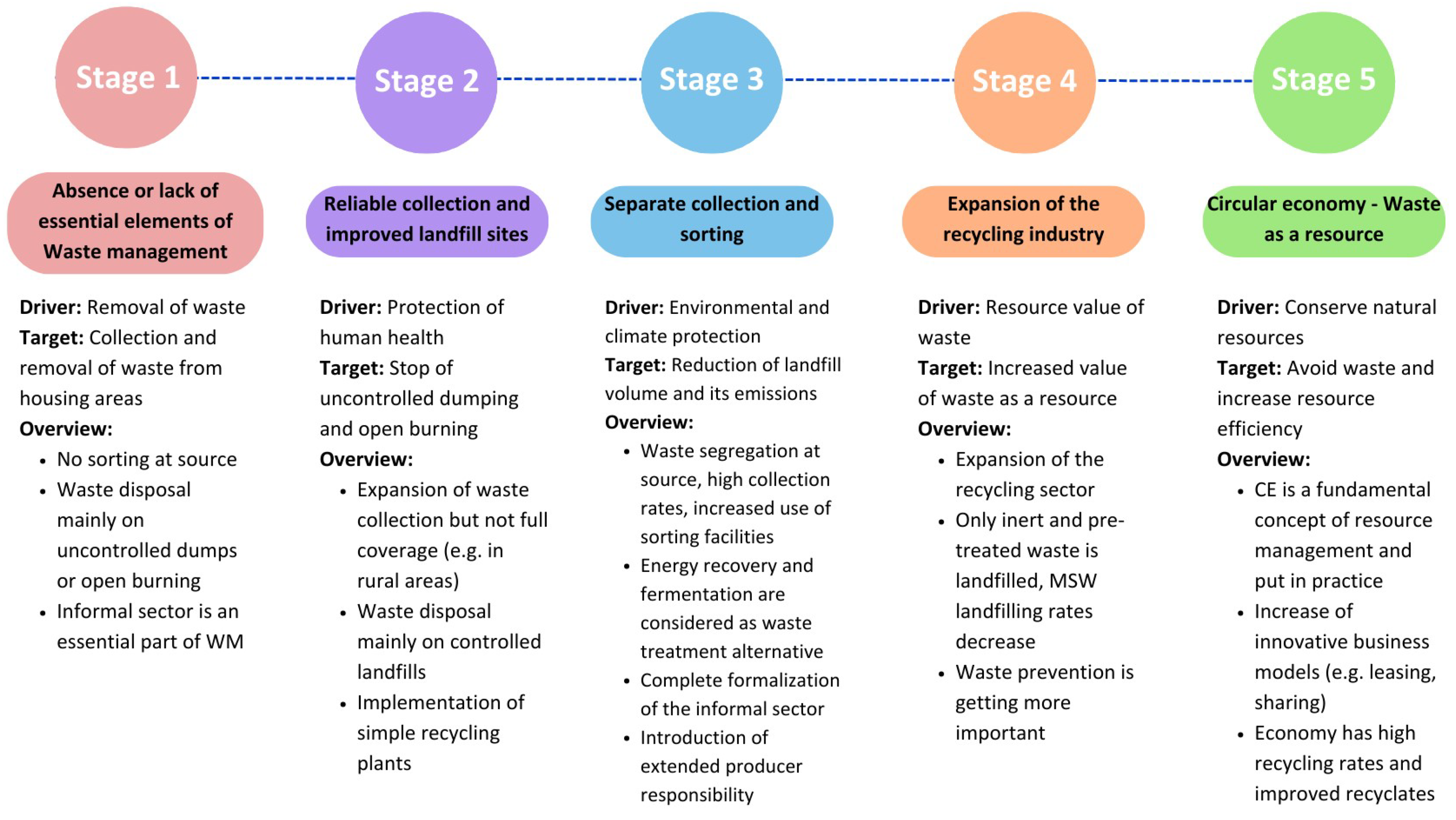

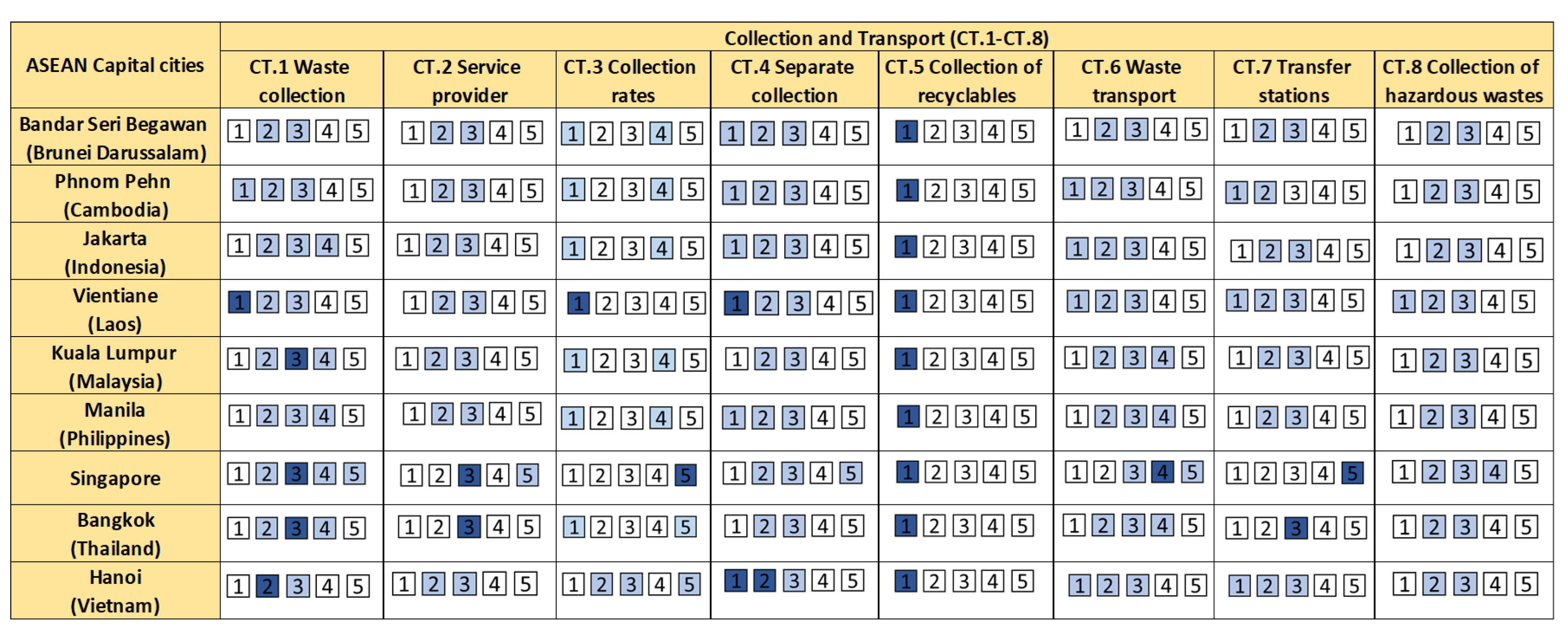
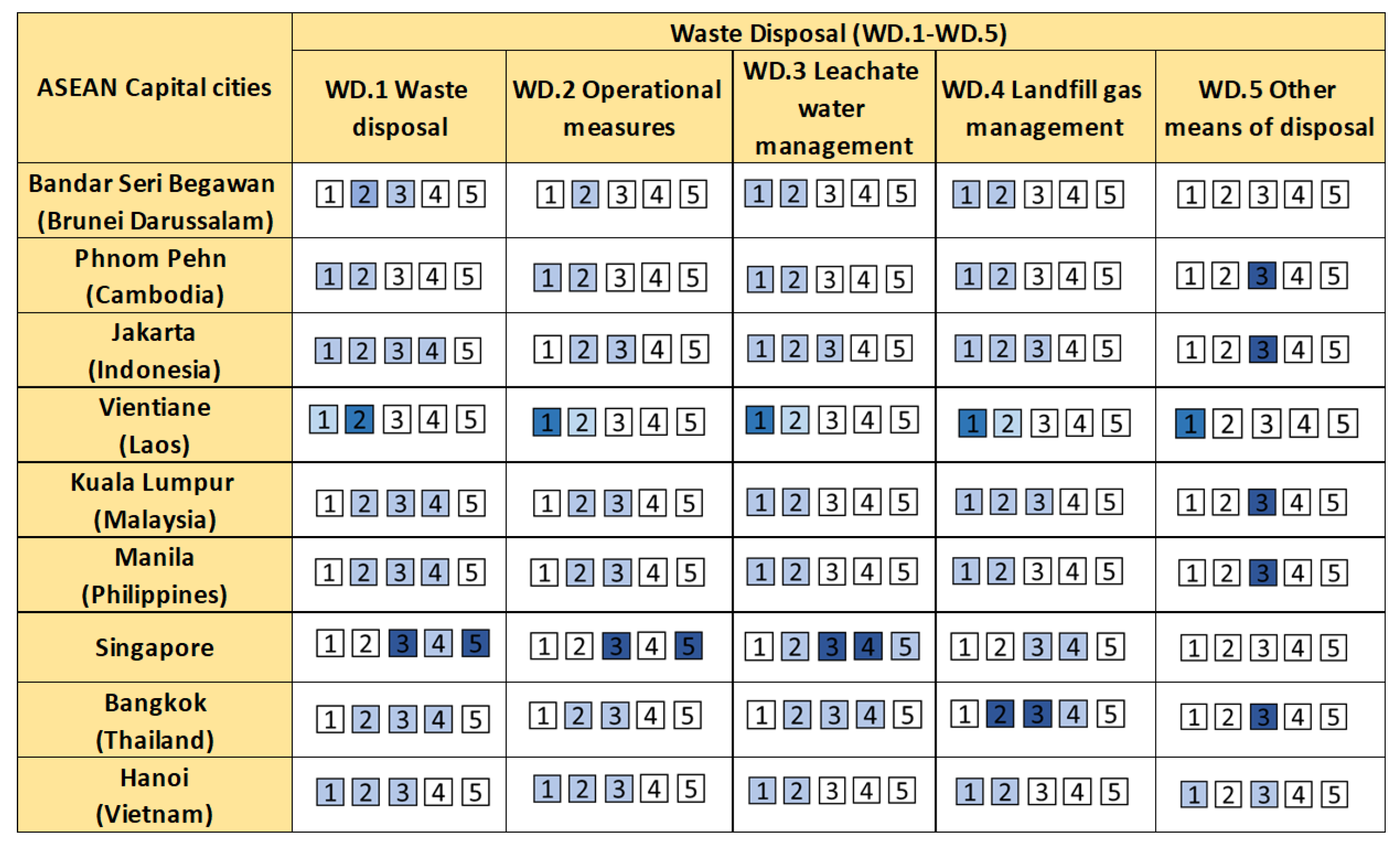
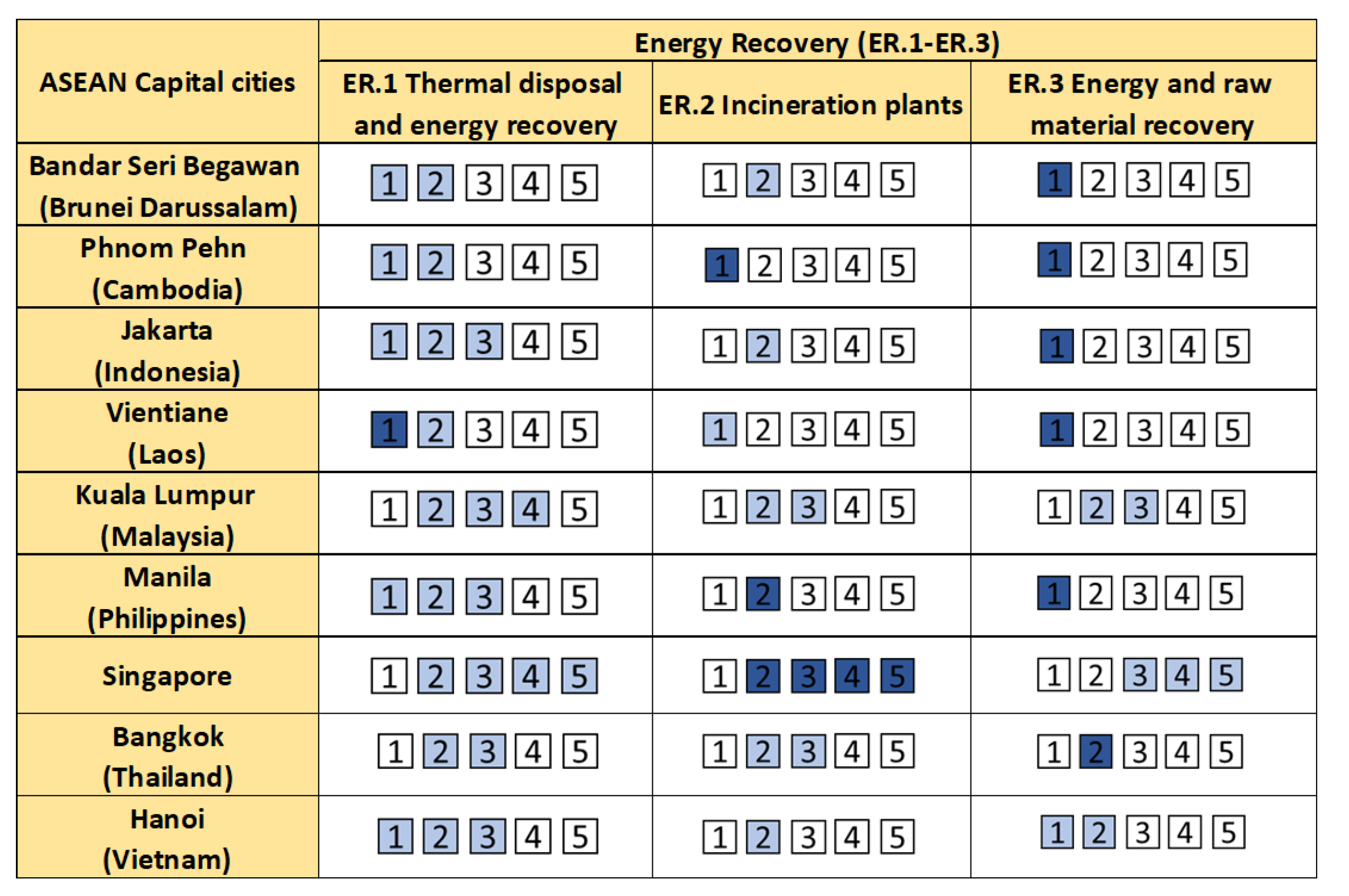

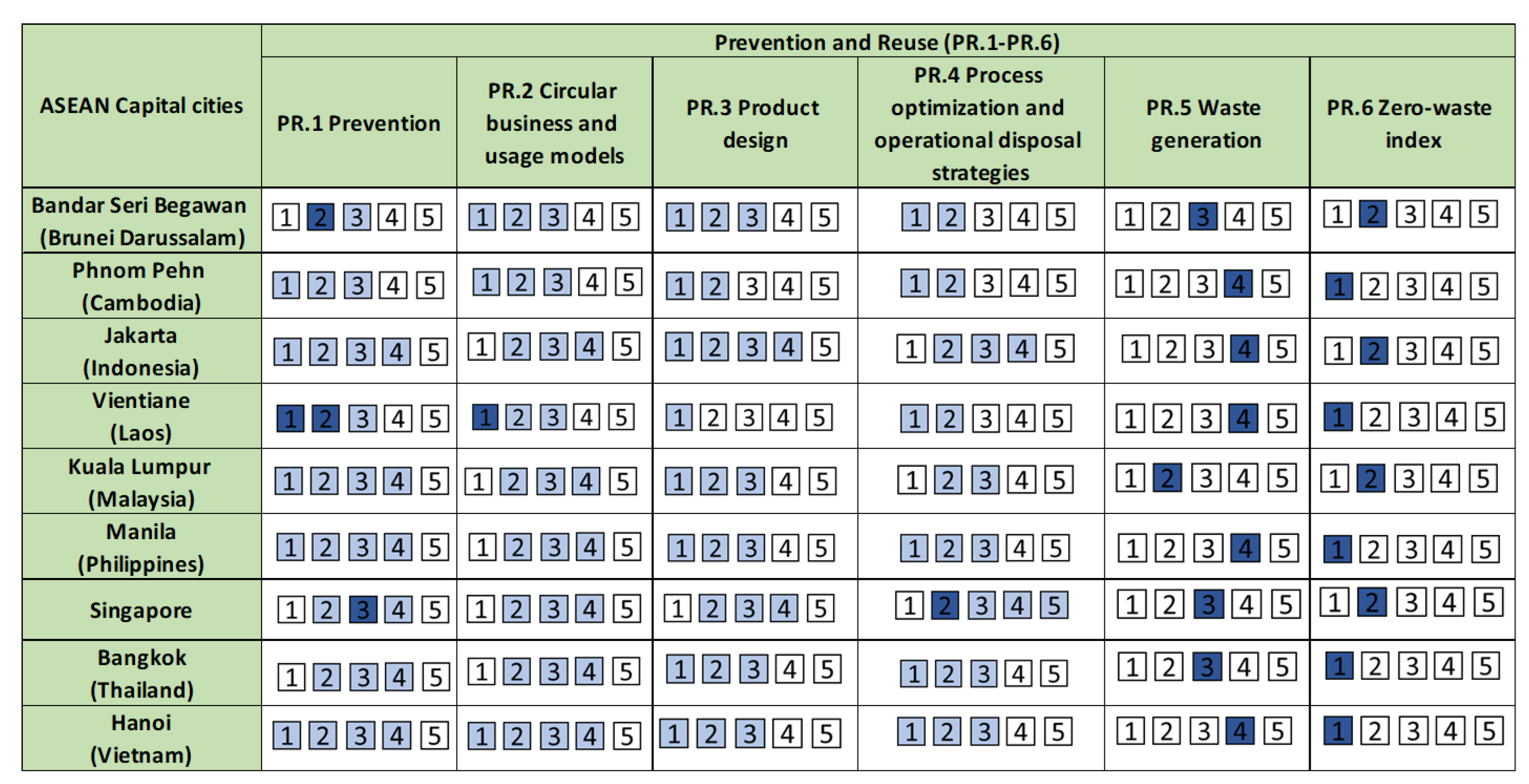
| WMS Components | Subcomponent 1 |
|---|---|
| Collection and Transport “CT” | CT.1 Waste collection CT.2 Service provider CT.3 Collection rates CT.4 Separate collection CT.5 Collection of recyclables CT.6 Waste transport CT.7 Transfer stations CT.8 Collection of hazardous wastes |
| Waste disposal “WD” | WD.1 Waste disposal WD.2 Operational measures WD.3 Leachate water management WD.4 Landfill gas management WD.5 Other means of disposal |
| Energy recovery “ER” | ER.1 Thermal disposal and energy recovery ER.2 Incineration plants ER.3 Energy and raw material recovery |
| Waste recycling “WR” | WR.1 Waste recycling WR.2 Composting WR.3 Fermentation WR.4 Sorting and recycling plants WR.5 RDFs WR.6 Recycling of construction and demolition waste WR.7 Recycling rates WR.8 Diversion rate (DR) and circular material use rate (CMUR) |
| Prevention and reuse “PR” | Pr.1 Prevention PR.2 Circular business and usage models PR.3 Product design; process optimization and operational disposal strategies PR.4 Waste generation PR.5 Zero Waste Index (ZWI) |
| Stage 1 | Stage 2 | Stage 3 | Stage 4 | Stage 5 | ||||||
|---|---|---|---|---|---|---|---|---|---|---|
| Collection and transport (CT.1–CT.8) | ||||||||||
| CT.1 | CT.1.1.1 Lack of systematic collection; limited collection | nm | CT.1.2.1 Collection is systematic, but inefficient | nm | CT.1.3.1 Efficient collection through optimizing measures and concepts | m | CT.1.4.1 Underground systems in public spaces | pm | CT.1.5.1 Waste bins have no negative effect on landscape | pm |
| CT.1.1.2 Lack of uniform collection bins | nm | CT.1.2.2 Use of uniform aboveground systems | m | CT.1.3.2 Use of new bin systems (e.g., waste locks) | m | CT.1.4.2 Waste bins with fill level sensors | pm | CT.1.5.2 Avoid of container overfilling (smart bins) | pm | |
| CT.1.2.3 Collection points are within 200m distance | m | CT.1.3.3 Service provision of cleaning up bins | m | CT.1.4.3 Introduction of digitalization measures | m | CT.1.5.3 Smart waste container separation | nm | |||
| CT.1.1.3 Missing of basic principles of urban hygiene, major littering exists | nm | CT.1.2.4 Urban hygiene principles are partially met, but littering in public spaces remains a problem | nm | CT.1.5.4 Full maintainance of urban hygiene principles and no littering in public spaces | m | |||||
| Stage 1 | Stage 2 | Stage 3 | Stage 4 | Stage 5 | ||
|---|---|---|---|---|---|---|
| Collection and transport | CT.1 Waste collection | |||||
| CT.2 Service provider | ||||||
| CT.3 Collection rates | ||||||
| CT.4 Separate collection | ||||||
| CT.5 Collection of recyclables | ||||||
| CT.6 Waste transport | ||||||
| CT.7 Transfer stations | ||||||
| CT.8 Collection of hazardous wastes | ||||||
| ASEAN Capital Cities | General Information | |||
|---|---|---|---|---|
| Population | Income Level | Waste Generation Rate (kg/cap/day) | Collection Rate (Urban) % | |
| Bandar Seri Begawan (Brunei Darussalam) | 318,530 | High | 1.15 | 90 |
| Phnom Pehn (Cambodia) | 2,281,951 | Lower middle | 0.91 | 83-92 |
| Jakarta (Indonesia) | 10,562,088 | Upper middle | 0.7 | 80-98 |
| Vientiane (Laos) | 948,477 | Lower middle | 0.68 | < 50 |
| Kuala Lumpur (Malaysia) | 1,945,200 | Upper middle | 1.21 | 80 |
| Manila (Philippines) | 13,484,482 | Lower middle | 0.69 | 81 |
| Singapore | 5,685,807 | High | 1.02 | 100 |
| Bangkok (Thailand) | 10,944,863 | Upper middle | 1.35 | 99 |
| Hanoi (Vietnam) | 8,053,663 | Lower middle | 0.63 | 98 |
| Stage 1 | Stage 2 | Stage 3 | Stage 4 | Stage 5 | ||
|---|---|---|---|---|---|---|
| Collection and transport | CT.1 Waste collection | |||||
| CT.2 Service provider | ||||||
| CT.3 Collection rates | ||||||
| CT.4 Separate collection | ||||||
| CT.5 Collection of recyclables | ||||||
| CT.6 Waste transport | ||||||
| CT.7 Transfer stations | ||||||
| CT.8 Collection of hazardous wastes | ||||||
Disclaimer/Publisher’s Note: The statements, opinions and data contained in all publications are solely those of the individual author(s) and contributor(s) and not of MDPI and/or the editor(s). MDPI and/or the editor(s) disclaim responsibility for any injury to people or property resulting from any ideas, methods, instructions or products referred to in the content. |
© 2024 by the authors. Licensee MDPI, Basel, Switzerland. This article is an open access article distributed under the terms and conditions of the Creative Commons Attribution (CC BY) license (https://creativecommons.org/licenses/by/4.0/).
Share and Cite
Soudachanh, S.; Campitelli, A.; Salhofer, S. Identifying Priorities for the Development of Waste Management Systems in ASEAN Cities. Waste 2024, 2, 102-121. https://doi.org/10.3390/waste2010006
Soudachanh S, Campitelli A, Salhofer S. Identifying Priorities for the Development of Waste Management Systems in ASEAN Cities. Waste. 2024; 2(1):102-121. https://doi.org/10.3390/waste2010006
Chicago/Turabian StyleSoudachanh, Souphaphone, Alessio Campitelli, and Stefan Salhofer. 2024. "Identifying Priorities for the Development of Waste Management Systems in ASEAN Cities" Waste 2, no. 1: 102-121. https://doi.org/10.3390/waste2010006
APA StyleSoudachanh, S., Campitelli, A., & Salhofer, S. (2024). Identifying Priorities for the Development of Waste Management Systems in ASEAN Cities. Waste, 2(1), 102-121. https://doi.org/10.3390/waste2010006








